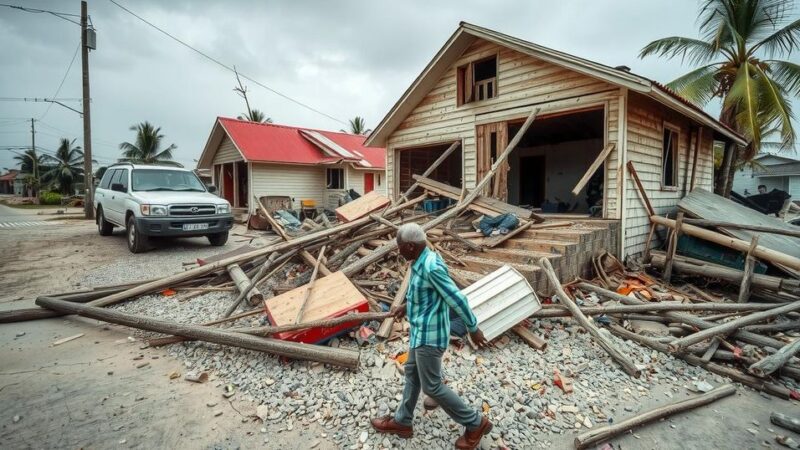The death toll from a landslide in eastern Uganda has risen to 17, with over 100 people missing. The landslide, caused by heavy rain, buried several homes in the Bulambuli district. The Ugandan government has warned residents in at-risk areas to relocate as search and rescue operations continue in response to the disaster.
The death toll resulting from a devastating landslide in eastern Uganda has tragically increased to 17, as reported by a government spokesperson. This disaster, triggered by heavy rainfall, took place in the Bulambuli district on Wednesday and buried numerous homes across several villages, leaving over 100 individuals unaccounted for. Local media footage revealed extensive areas covered in mud where homes and schools previously stood, while anguished survivors mourned for their missing relatives as rescue teams endeavored to locate survivors within the debris.
Charles Odongtho, the spokesperson for the Office of the Prime Minister, expressed his dismay at the rising death toll, emphasizing that the government had issued warnings to residents in landslide-prone regions ahead of the seasonal rains. According to the Uganda Red Cross Society, at least 45 households were entirely buried, with an additional number suffering partial damage. Local lawmaker Ignatius Wamakuyu Mudimi shared a personal tragedy, revealing that his niece and her newborn were among the casualties.
In response to the increasing threat of landslides, the Ugandan government has advised residents in vulnerable areas to relocate, while the Red Cross and police continue their search-and-rescue efforts. Since October, Uganda has experienced unusually heavy rainfall, which has resulted in widespread flooding and landslides. A recent report indicated that torrential rain caused the River Nile to overflow, inundating a vital highway connecting Kampala to the northwestern region.
The mountainous regions of Uganda, particularly those impacted by this recent disaster, have a history of similar catastrophes, including a devastating avalanche in 2010 that claimed the lives of at least 80 individuals. The aggravation of landslide risks in these areas is attributed to deforestation and the conversion of land for agricultural purposes.
The combination of natural factors and human-induced changes continues to pose dire risks to communities residing in mountainous, vulnerable regions of Uganda. In light of these events, it is imperative for residents and authorities to take preventive measures to mitigate the impacts of such environmental hazards.
The ongoing situation in Uganda highlights the increased vulnerability of certain regions to natural disasters, particularly landslides, exacerbated by severe rainfall patterns and human activity such as deforestation. The country’s geographical features, characterized by mountainous terrain, make it susceptible to such disasters, which have historically caused significant loss of life and property. As climate change continues to influence weather patterns, understanding and addressing these risks becomes crucial for community safety and resilience.
In conclusion, the recent landslide in eastern Uganda underscores the serious implications of extreme weather and environmental degradation on human life and safety. With 17 confirmed fatalities and over 100 individuals missing, the urgency for effective disaster response and community education on risk management is paramount. The call for relocation from landslide-prone areas is a testament to the ongoing need for adaptive strategies to safeguard lives in vulnerable regions. It is crucial to heighten awareness and implement preventive measures to prevent future tragedies.
Original Source: dunyanews.tv







